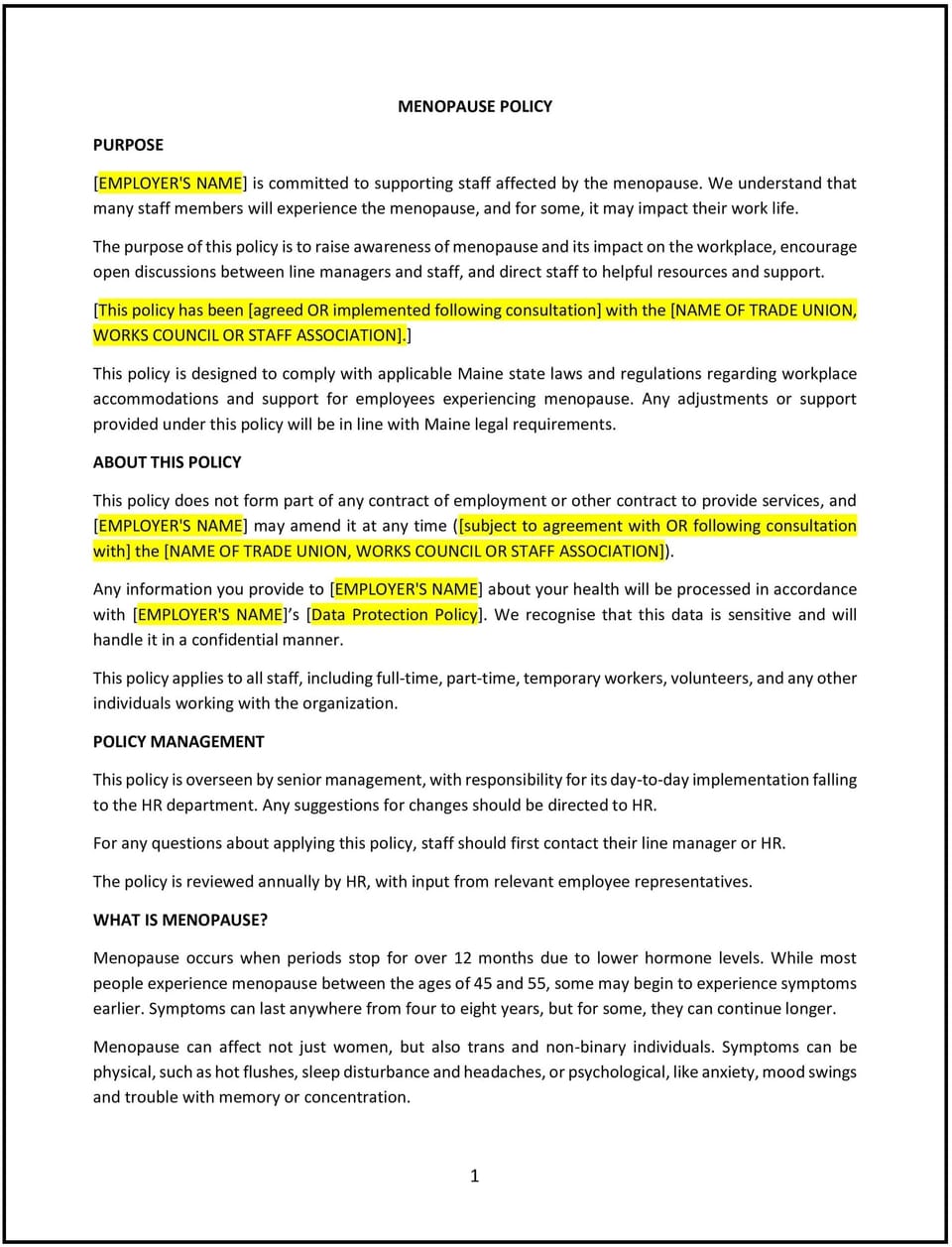Menopause policy (Maine): Free template

Menopause policy (Maine): Free template
This menopause policy is designed to help Maine businesses create a supportive environment for employees experiencing menopause. It outlines the company's commitment to supporting employees’ health and well-being by providing reasonable accommodations, promoting awareness, and ensuring a respectful and inclusive workplace.
By implementing this policy, Maine businesses can foster a positive workplace culture, support employees during menopause, and support compliance with applicable laws on health and employee welfare.
How to use this menopause policy (Maine)
- Define menopause: Clearly outline what menopause is and its potential impact on employees, including symptoms like hot flashes, fatigue, and mood swings.
- Establish support measures: Provide guidelines for reasonable accommodations, such as flexible working hours, access to cooling devices, or changes to job responsibilities, if necessary.
- Promote awareness: Offer training for managers and staff on menopause to reduce stigma, encourage understanding, and foster a supportive work environment.
- Protect privacy: Ensure confidentiality for employees disclosing menopause-related issues and provide clear guidance on managing sensitive health information.
- Address flexible working arrangements: Detail how employees may request adjustments to their schedules or working conditions to better manage menopause-related symptoms.
- Encourage open communication: Create an environment where employees feel comfortable discussing their needs and asking for support without fear of discrimination.
- Review regularly: Update the policy as necessary to reflect changes in Maine labor laws, workplace practices, or employee feedback.
Benefits of using this menopause policy (Maine)
Implementing this policy provides several benefits for Maine businesses:
- Supports employee well-being: Provides employees with the tools and support they need to manage menopause symptoms while continuing to work.
- Reduces stigma: Encourages open dialogue, making menopause a normal part of the workplace conversation.
- Enhances productivity: By offering support and accommodations, employees can better manage symptoms and maintain their productivity.
- Improves retention: Demonstrates the business’s commitment to supporting employees’ health, leading to higher job satisfaction and retention.
- Ensures compliance: Aligns with Maine's commitment to gender equality and anti-discrimination laws.
Tips for using this menopause policy (Maine)
- Educate managers: Provide training to managers to help them recognize menopause-related symptoms and understand the accommodations that may be necessary.
- Be flexible: Offer flexibility in working hours or duties, where possible, to accommodate employees experiencing menopause-related symptoms.
- Foster open communication: Encourage employees to speak up if they need support and ensure confidentiality is respected.
- Monitor feedback: Regularly gather feedback from employees to ensure that accommodations and support measures are effective.
- Stay informed: Keep up to date with any changes in labor laws or health recommendations related to menopause in the workplace.
- Create a supportive culture: Foster a workplace culture that supports not only menopause but all aspects of health and wellness for employees.
Q: What accommodations might employees need for menopause-related symptoms?
A: Employees may require flexible work hours, access to cooling devices, regular breaks, or adjustments to their workspace to help manage symptoms.
Q: How can businesses ensure employees feel comfortable discussing menopause?
A: Businesses should provide training for managers, reduce stigma through open dialogue, and ensure privacy when employees disclose personal health information.
Q: Is menopause considered a disability?
A: While menopause is not classified as a disability under U.S. federal law, employees experiencing severe symptoms may require accommodations to perform their jobs effectively, which can be addressed under this policy.
Q: How often should businesses review their menopause policy?
A: Businesses should review the policy annually or whenever there are updates to Maine labor laws or workplace practices that may affect the policy’s effectiveness.
Q: Can employees request flexible work arrangements due to menopause?
A: Yes, employees can request adjustments to their schedules or work environment if menopause symptoms are affecting their ability to perform their duties effectively.
Q: How should businesses handle menopause-related health information?
A: Businesses should maintain confidentiality and only share health information on a need-to-know basis, ensuring employees’ privacy is respected.
Q: How can businesses promote awareness about menopause in the workplace?
A: Businesses can offer training sessions for managers, provide educational materials for staff, and create a supportive environment where menopause is openly discussed.
This article contains general legal information and does not contain legal advice. Cobrief is not a law firm or a substitute for an attorney or law firm. The law is complex and changes often. For legal advice, please ask a lawyer.


